 Hello, gentle readers, and welcome to the RPG Reload, the weekly feature where punch skeletons for apples. Each week, we take a look at an RPG from the App Store’s past to see how it’s doing in modern times. It’s a bit of reflecting, a bit of revisiting, and a chance to take a deeper dive than our reviews usually allow for. I try to present as diverse a selection of RPGs from week to week as I can muster, but if you feel like I’ve missed something important, please let me know. You can give suggestions by commenting below, posting in the Official RPG Reload Club thread, or by tweeting me at @RPGReload. Since the schedule is planned pretty far ahead of time, you probably won’t see any games you suggest soon, but you will see them eventually.
Hello, gentle readers, and welcome to the RPG Reload, the weekly feature where punch skeletons for apples. Each week, we take a look at an RPG from the App Store’s past to see how it’s doing in modern times. It’s a bit of reflecting, a bit of revisiting, and a chance to take a deeper dive than our reviews usually allow for. I try to present as diverse a selection of RPGs from week to week as I can muster, but if you feel like I’ve missed something important, please let me know. You can give suggestions by commenting below, posting in the Official RPG Reload Club thread, or by tweeting me at @RPGReload. Since the schedule is planned pretty far ahead of time, you probably won’t see any games you suggest soon, but you will see them eventually.
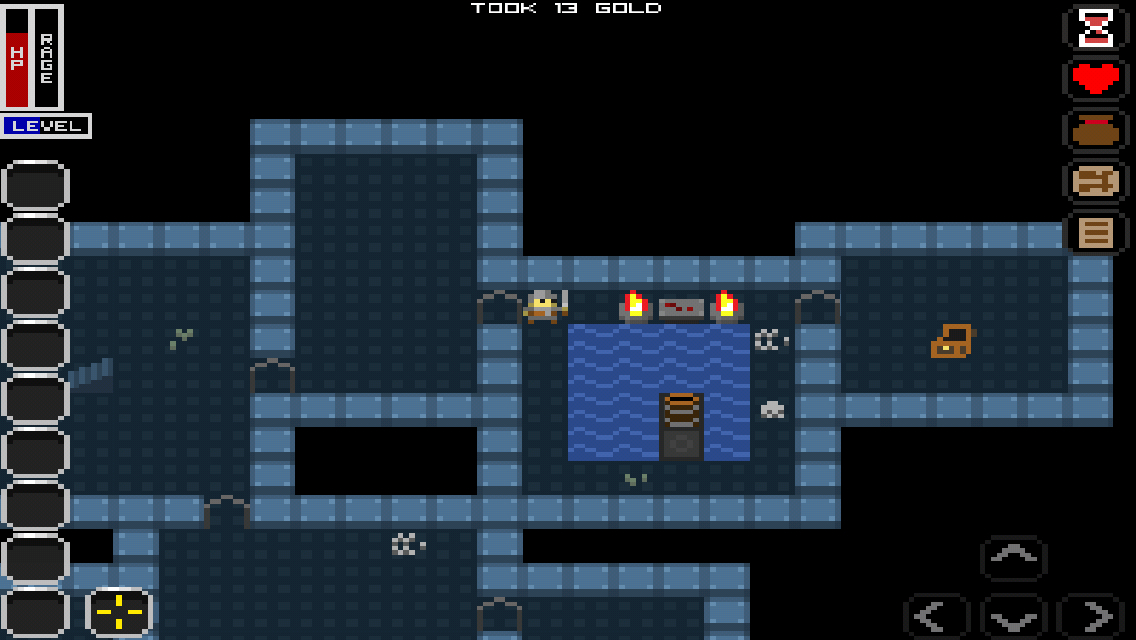
By now, iOS has so many roguelike and roguelike-inspired games that it’s more novel when a week passes without a new one releasing, but there was a time when things weren’t quite so bountiful. Legends Of Yore (Free) is one of the products of that time. Before we get underway, I should state that at the time of this writing, Legends Of Yore does not work on iOS 9. Please do not purchase the game if you’re using iOS 9. It might be fixed one day, or it might not. Typically, I don’t like to cover games in the RPG Reload that aren’t working properly on the newest hardware and iOS version, but I realized it too late to make a substitution this week. So let’s just call this one a bit of appreciation for a great game that might not be with us much longer.
Legends Of Yore feels like a game that started as a roguelike but eventually grew into something closer to a regular RPG. There are some options you can turn on that make it feel more like a roguelike, such as permadeath, but even with those options on this is pretty squarely a hybrid in its current form. Legends Of Yore is the work of UK developer Coke And Code, which as near as I can tell is a one-man operation run by a man named Kevin Glass. On his personal website, he mentions the Ultima and Legend Of Zelda series as his favorite games, giving some insight into potential inspirations for Legends Of Yore.
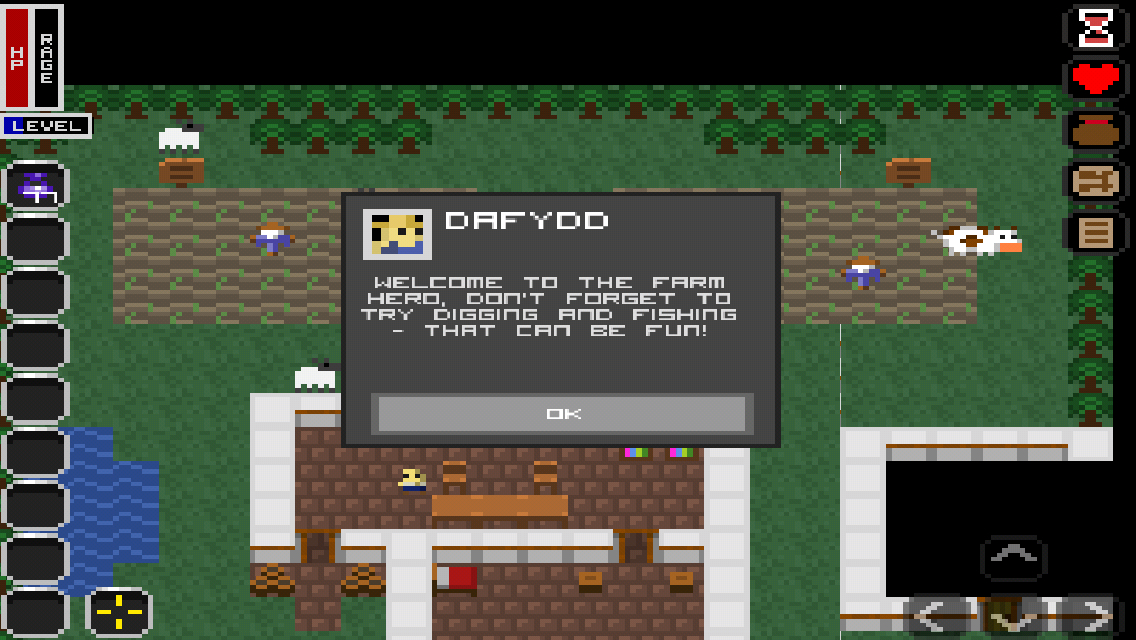
The game released first on PC in April of 2011, but came out only weeks later on iOS. That first release didn’t have a lot of content to it, including only one town, a graveyard, and a couple of dungeons. Of course, it was free, so it was hard to complain too much. I’m only mentioning it in light of how big the game ended up becoming thanks to Glass’s near-constant updates over the course of the following two years. At present, the game includes more than 41,000 tiles of overworld map, more than 25 dungeons, 10 towns, and tons of monsters, items, and quests. So while it initially may have started as a more casual take on something like Sword Of Fargoal (Free), Legends Of Yore ended up far closer to Ultima‘s side of the RPG pool. The last update to the game was in July of 2013, and as mentioned previously, stopped functioning from iOS 9 forward. A remaster of the game is currently being developed for the PC and Wii U, and Coke And Code seems to have at least a couple of other projects in the fire, so it might just be that it’s too busy right now to patch the game up.
Anyway, let’s talk about the game itself, because Legends Of Yore is rather interesting. You play as the Hero Of Yore, who can be one of three different starting job classes. There’s a close-range Warrior, a long-range Wizard, and an Archer who is a mix of the two. Each class has at least a couple of special abilities unique to them, and much of the gear in the game is class-restricted, so you’re going to have a slightly different experience with each one. Regardless of who you choose, you’re dumped in the first town right next to a stairwell. You can either dive in or take a look around the town. If you do the latter, you’ll find a few different shops and a mayor who will heal you for free and issue quests for you to solve. Poking around further will reveal a guard who won’t let you past until you’ve reached the appropriate level, a graveyard full of skeletons with another set of stairs, and a farm that holds one further set of stairs. There’s no way to leave town until you’ve satisfied the guard’s condition of reaching level 6, so it’s a matter of choosing which of the three dungeons you want to start in and getting down to the business of gathering experience.
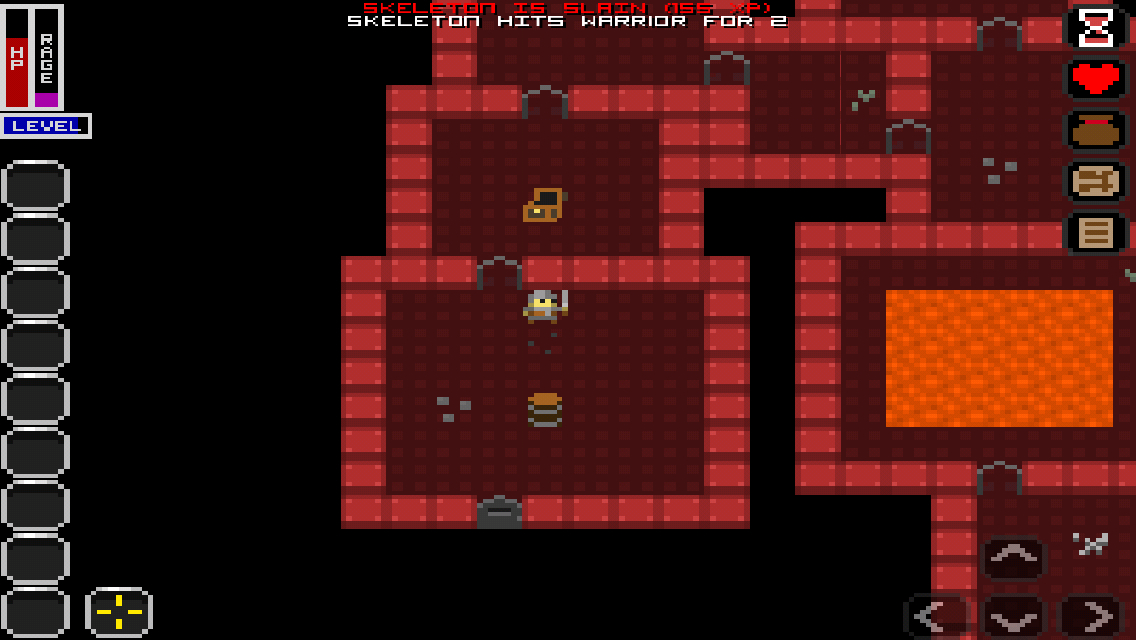
While the game uses experience levels as gateways at many points, this first area is as linear as it gets. Considering you immediately have your choice of three different dungeons, that’s a promising start. Most of the equipment in the game is restricted by level, and many of the quests require you to be of a certain level as well. There’s a quest that works as the end of the game, but the actual goal of the game is the usual RPG staple: get experience, gather gold, upgrade your gear, take on bigger targets that help you do all three of those things more quickly. It’s a long haul in Legends Of Yore, and to be frank, it’s not something you’ll want to knock out in long sessions for the most part. There aren’t many gamechangers in the course of the adventure, so you’ll mostly be doing the same routines. Exactly what that routine entails depends on the job class you selected, so for example, if you’re the Warrior, you’ll be doing a lot of bumping into enemies and quaffing health potions. That’s fine, though. The game aspired to be a casual roguelike and I think it went well beyond that goal. It was always meant to be played in short periods of time. That the full game ended up being incredibly big just means it’ll take a very long time before you run out of stuff to do in those short sessions.
Once you descend into a dungeon, Yore‘s roguelike roots become a lot clearer. The dungeon floors are newly generated every time you enter them, so even if you head right back up the stairs you just went down, the floor will have a fresh layout. Your goal varies depending on the dungeon or quest, but generally you’ll want to find the staircase down to the next floor, which may or may not require you to first find a key somewhere on the floor. At the bottom of the dungeon, you’ll usually face some sort of large boss-type monster, after which you can haul yourself out manually or take a town portal back home. If you were exploring the dungeon for a quest, you might get a little text box telling you to come back and claim your prize, but if you were just in there unprompted, there won’t be any fanfare for completing it. No, the rewards come in the form of the gold, gear, and experience points you’ve gathered, all of which will ideally pave the way towards satisfying the requirements for your next quest.
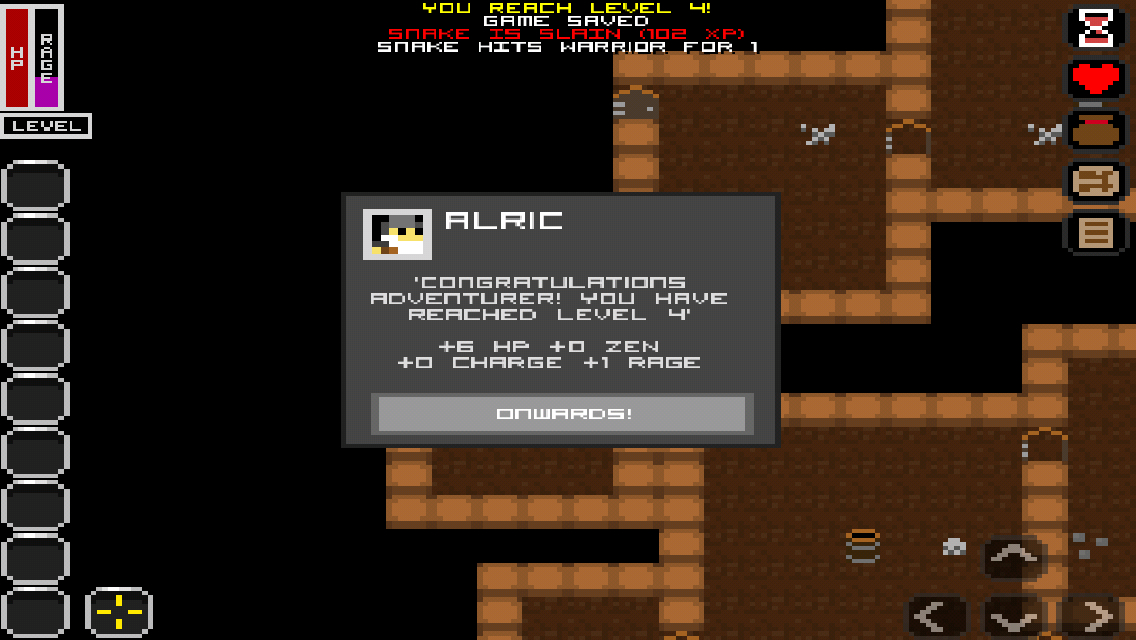
The game is turn-based, so for every move you make, monsters can also take an action. They won’t actually do anything until you open the door to their rooms, though, at which point melee attackers will immediately try to close the distance while ranged attackers will pick away at you from wherever they’re standing. Upon killing a monster, they might drop a bag with some loot in it, and if you’re very lucky some of it will be rare and useful to your job class. The rest can be sold for gold. Besides battling monsters, you’ll also search through the occasional chest or barrel for loot, but you’ll want to watch out for traps. Exploration is done room by room, with the contents of each remaining unknown until you open the door. One nice touch is that the dungeons sometimes contain items that serve no practical purpose but are there to add a little ambiance.
Once you’ve reached level 6 and gotten that pesky guard to move, the game completely opens up. You can travel to several locations, though the enemies act as sort of a soft gate keeping you from going anywhere you’re truly not meant to be. The overworld itself is kind of like that in The Legend Of Zelda games, with big open areas full of enemies, forests with tricky paths, and so on. The gameplay remains the same as in the dungeons, naturally, so you’ll be engaging in turn-based fighting as opposed to the action-based approach seen in Zelda. The presence of multiple towns gives a little of the Ultima feel, where you never know when you’re going to stumble on a new location full of quests to accomplish in some nearby dungeon. It’s a little odd to be navigating this kind of world in a roguelike engine, but I rather like it.
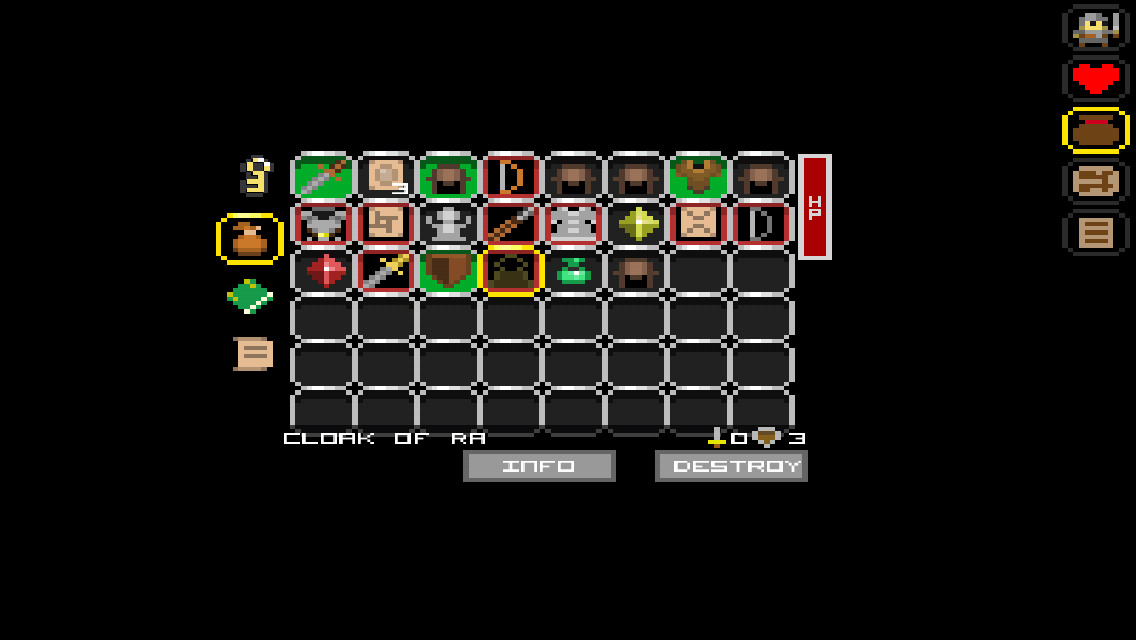
Unless you intentionally flip the switches to make it otherwise, Legends Of Yore is a very forgiving game. You can use a town portal to travel into and out of dungeons easily, health potions are a dime a dozen, and gold comes easily. If you die, you’ll lose some items at worst, but you can also stash items in a safe chest in the town where they will be kept safe. If you follow the questlines, you’ll more or less level up at the rate you need to get through the game without having to stop and grind, and knowing whether or not you’re in an appropriate area for your level is a simple matter of nudging up against the first enemy you see and checking the damage dealt. Even if you do turn on the options to make the game more difficult, it’s easy to tell it’s not really designed to be played that way. Legends Of Yore is best enjoyed by the kind of player who just wants something to pull out and chew on a little here and there, without a heavy commitment. There’s no important overarching narrative to keep track of, no clues for difficult puzzles, and very little gameplay mastery required to move forward.
It’s unfortunate the game doesn’t work anymore, because I feel like there’s nothing else exactly like Legends Of Yore on the App Store. Most roguelikes stay focused for obvious reasons, so a developer expanding those familiar mechanics out into a full open-world RPG isn’t something that happens too often. Hopefully, Coke And Code will have the chance to fix it up at some point, or even better, port the remaster over to iOS. Until then, this classic iOS RPG is only playable to those who keep an older device around. It’s a sad fate for a game many would consider a permanent fixture on their phones.
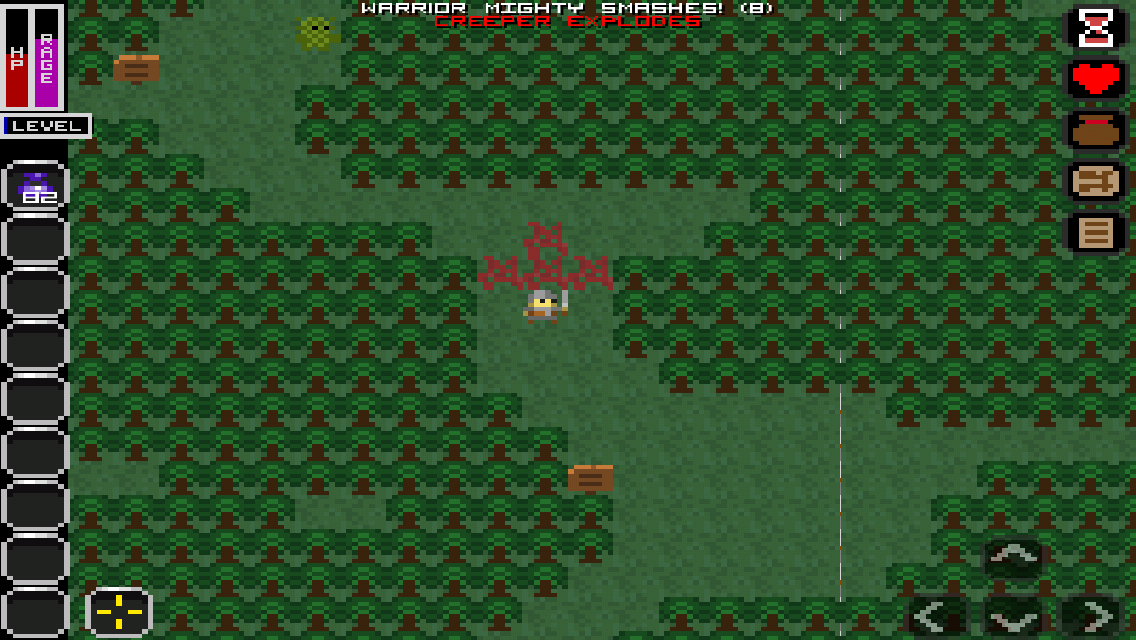
That’s my take on Legends Of Yore, but what do you all think of the game? You can let me know by leaving a comment below, stopping by the Official RPG Reload Club thread, or by tweeting me at @RPGReload. Oh, and we’ll be recording the next episode of the RPG Reload Podcast this weekend, so if you have any questions you want answered, you can fire those emails off to [email protected]. The main topic of the episode will be Nameless: The Hackers RPG ($7.99), but you can ask about anything you want.
I’ll also mention that if you like the RPG Reload and want to express that in a financial way, the TouchArcade Patreon is a nice way to do that. It’s how we justify spending time on writing about older games when said articles don’t exactly light up the charts in terms of traffic. As for me, I’ll be back next week with the latest chapter of our on-going History Of Handheld RPGs feature. Thanks for reading!
Next Week’s Reload: The History Of Handheld RPGs, Part Six